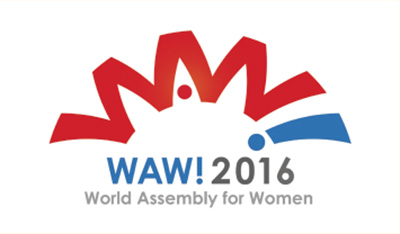Diplomatic Bluebook 2017
Chapter 3
Japan's Foreign Policy to Promote National and Worldwide Interests
8.Women
Japan has been calling for the realization of “a society where all women shine,” and strengthening its efforts to that end.
(1) Matters agreed upon at the G7 Ise-Shima Summit
At the G7 Ise-Shima Summit, Japan led the discussion on gender issues as one of the priority agenda. The G7 leaders endorsed the “G7 Guiding Principles for Capacity Building of Women and Girls” and the “Women's Initiative in Developing STEM Career (WINDS),” focusing on women's empowerment through education and training, promotion of women's active role in the fields of natural science and technology, as well as women, peace and security (WPS).
(2) World Assembly for Women, “WAW! 2016”
Prime Minister Abe took the initiative to host the 3rd World Assembly for Women “WAW! 2016,” on December 13 and 14, which brought together 93 leaders from various fields related to the empowerment of women from 11 international organizations and 26 countries. The theme of 2016 was “WAW! for Action.” Japan sent a message to change “attitudes” through “action” aiming for a society in which all people can participate in their own way without constraints. Participants called for a change in the current way of working that obstruct women's social participation and mindset about role sharing between men and women.
They also discussed women's health, women's participation and empowerment in the area of peace and security, and regional revitalization. This year's proposal, “WAW! To Do 2016,” was sent out after the discussions and distributed as a UN document (A/71/829) following the 2015 version.
On the first day of WAW! 2016 (December 13), a special event, “Shining Future of Women in STEM (Science, Technology, Engineering and Mathematics) Fields,” was held as a part of the initiative called WINDS (Women's Initiative in Developing STEM Careers) which was launched at the G7 Ise-Shima Summit.
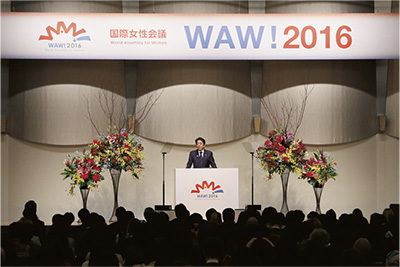 Prime Minister Abe at the Public Forum of the World Assembly for Women (WAW! 2016) (December 13, Tokyo Photo: Cabinet Public Relations Office).
Prime Minister Abe at the Public Forum of the World Assembly for Women (WAW! 2016) (December 13, Tokyo Photo: Cabinet Public Relations Office).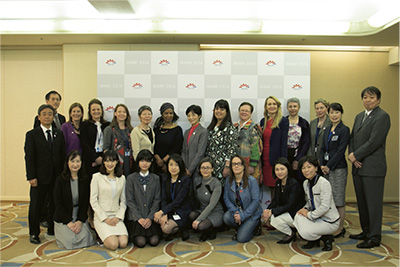 Participants of “Shining Future of Women in STEM Fields” (December 13, Tokyo).
Participants of “Shining Future of Women in STEM Fields” (December 13, Tokyo).(3) International Cooperation for the Empowerment of Women in Developing Countries
During the General Debate Session at the UN General Assembly in 2013, Prime Minister Abe announced that the Government would be providing Official Development Assistance (ODA) of more than 3 billion dollars over three years until 2015 for three areas with a focus on the empowerment of women: (1) facilitating women's active participation in society and women's empowerment; (2) enhancing Japan's efforts in the area of women's health care as a part of the Strategy on Global Health Diplomacy; and (3) supporting women's participation and protecting their rights in the area of peace and security. These have been fully implemented. In May 2016, the government announced the “Development Strategy for Gender Equality and Women's Empowerment,” formulated as one of the new thematic policies under the Development Cooperation Charter, and declared that measures would be implemented to train about 5,000 female government administrative officials and to improve the learning environment for about 50,000 girls over the three years from 2016 to 2018. At the3rd World Assembly for Women (WAW! 2016) held in December the same year, Prime Minister Abe promised to provide support amounting to more than 3 billion US dollars for women in developing countries until 2018 focusing on: (1) promoting women's and girls' rights; (2) creating an enabling environment for women and girls to reach their full potential; and (3) advancing women's leadership in politics, economics, and other public fields. These measures are being steadily implemented.
(4) Women Issues in the UN
The 60th session of the United States Commission on the Status of Women was held in March, and Japan sent a delegation comprising State Minister for Foreign Affairs Muto (Chief Delegate), Representative of Japan, Hiroko Hashimoto, representatives from various government ministries, the Japan International Cooperation Agency (JICA), and NGOs. At the conference, State Minister Muto chaired the Ministerial Roundtable and participated in an exchange of views among representatives from the respective countries about topics such as the empowerment of women and its relationship with sustainable development, the elimination and prevention of all forms of violence against women and girls, and other related issues. In his statement, State Minister Muto emphasized that Japan would fulfill its responsibility toward the 2030 Agenda as a member of the international community.
Japan contributed approximately 30 million US dollars in 2016 to the UN Women (United Nations Entity for Gender Equality and the Empowerment of Women) and the contributions are used in ways such as empowering Syrian refugee women and measures to counter violent extremism in Africa. Japan plans to continue to deepen its cooperation with the UN Women.
In September 2014, Japan submitted the 7th and 8th reports of the Government of Japan in accordance with the Convention on the Elimination of All Forms of Discrimination against Women to the United Nations. In addition to submitting its written responses to questions beforehand, Deputy Minister for Foreign Affairs Shinsuke Sugiyama and other delegates attended the consideration of reports held in Geneva on February 16, 2016. There, they responded to questions posed by the Committee and explained the facts and efforts by the Government of Japan on the comfort women issue44. Since 1987, Japan has been sending Japanese committee members to the Committee on the Elimination of All Forms of Discrimination against Women.
- 44 For details of Deputy Minister for Foreign Affairs Sugiyama's comments in the Q&A segment, refer to: http://www.mofa.go.jp/mofaj/files/000136254.pdf for Deputy Minister for Foreign Affairs Sugiyama's comments for the Q&A segment.
(5) Initiatives Focusing on Sexual Violence in Conflict
As Prime Minister Abe stated in his speech at the UN General Assembly in September 2014, sexual violence as a tactic of war must not be overlooked. To put an end to non-punishment for perpetrators and to support victims of violence are important. Thus, Japan continues to attach great importance to build partnerships with international organizations such as UN Action and the UN Special Representative of the Secretary-General on Sexual Violence in Conflict and participate in discussions at various international forums. At the same time, Japan is engaging in more proactive efforts in this field to make the 21st century a world with no human rights violations against women.
In 2016, Japan provided financial support of 2.7 million US dollars to the Office of the Special Representative of the UN Secretary-General for Sexual Violence in Conflict, contributing to strengthening the police and judicial capabilities of states concerned. Furthermore, Japan continues to make voluntary contributions to the Trust Fund for Victims of the International Criminal Court, earmarking approximately 47,000 Euros for victims of sexual and gender-based violence in 2016. Through such contributions, Japan engages in efforts to support victims of sexual violence in conflicts.
(6) National Action Plan regarding UN Security Council Resolution 1325
In order to realize a “peaceful” society more effectively, it is important to secure women's participation in all stages in conflict prevention, conflict resolution, and peacebuilding, with mainstreaming of gender perspective. Japan formulated its first National Action Plan on Women, Peace and Security aimed at implementing UN Security Council Resolution 1325 and other related resolutions which ensure women's inclusiveness in international peace and security efforts. Since 2016, the Action Plan has entered the implementation phase. Japan has been monitoring implementation status of the plan, and will publish its annual report at the end of FY 2016.
The Government of Japan hosted World Assembly for Women, WAW! 2016, on December 13 and 14. In the 3rd WAW!, a total of 93 leaders active in various fields of women issues gathered from 26 countries and 11 international organizations.
WAW! 2016 was held under the theme of “WAW! for Action,” and sent out the message of a change in “attitudes” through “action” and aiming for a society in which all people can participate in their own way without constraints.
Panel Discussion 1: Building Peace in Society by Women
[Moderator: Ms. Marriët Schuurman, NATO Secretary General's Special Representative for Women, Peace and Security. Panelists: Ms. Awut Deng Acuil, Minister of Gender, Child and Social Welfare, Republic of South Sudan, Ms. Sun Sreytouch, ICRC staff, Cambodia, and Ms. Sieng Sokchan, the captain of Cambodia's first women's wheelchair basketball team]
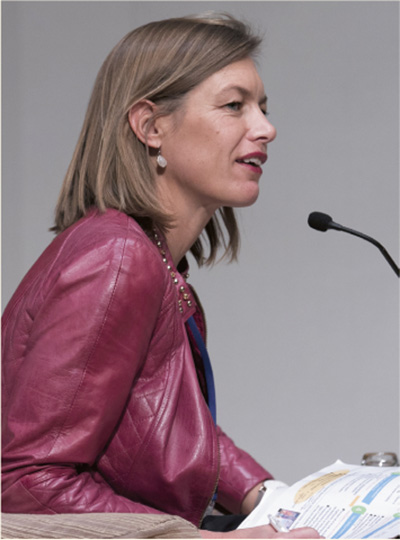 Ms. Marriët Schuurman
Ms. Marriët SchuurmanMs. Schuurman explained that UN Security Council Resolution 1325, adopted in 2000, seeks the active involvement of women in decision-making processes at all levels of peace and security, and is the first resolution to recognize women on the peace and security agenda. She also explained that women play an important and active role in peace negotiations and peace processes. She stated when women and civil society are involved in peace negotiations and peace processes, the probability of failure is 64% lower than the cases where they are not. And 35% of the peace agreements that women have contributed are maintained for 15 years or more. Those prove that societies with less gender inequality tend to have fewer conflicts. She emphasized that women play vital roles in achieving peace. However, promoting the active involvement of women in peacebuilding and its processes account for only 0.4% of official development assistance (ODA); the percentage of women's involvement in peace processes has remained at a low level with just 9% as negotiators, 4% as signatories of peace agreements, 3% as military personnel and 10% as police in the UN's peacekeeping operations (PKO) (the UN's target for women's participation in both military and police is 20%). She pointed out those facts showed “lacking in the idea of inclusiveness of women.”
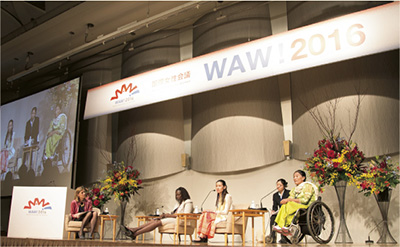 WAW! 2016 Panel Discussion
WAW! 2016 Panel Discussion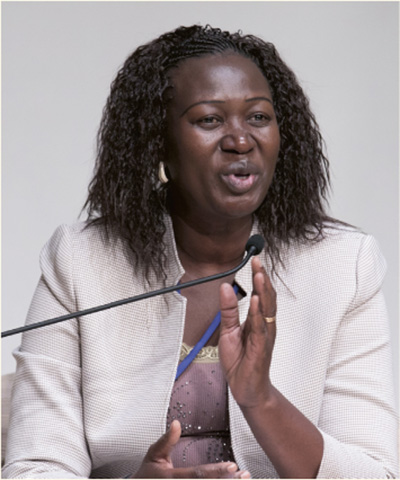 Ms. Awut Deng Acuil
Ms. Awut Deng AcuilMs. Awut explained her view that while women are intrinsically pacifists and arbitrators for peace, but local customs have created an environment that hampers women's leadership. They are also deprived of opportunities by the pervasive idea of male dominance over women at home. This has become the obstacle to the participation of women in peaceful societies. Ms. Awut spoke about her experience of visiting villages in South Sudan. She actually experienced existing unequal gender relations in villages through policies that cause discrimination against women. The idea of male dominance reproduces and reinforces the attitude to treat women just as voters but not as leaders in politics. It also reinforces the idea that women are not able to be leaders. As a result of the long period of oppression, women have become passive, and they tend not to advocate for their rights. Hence, Ms. Awut asserted that other than men, women should also change their mindset. In South Sudan today, positive action has been undertaken at the election to amend gender inequality in politics. As a result, the number of female parliamentary members has reached as many as 100, and women are also actively involved in peace processes. Ms. Awut emphasized that if women are given the opportunity, they will reach out and try to fulfill their purposes. However, it is vital for women to be more proactive to actively lead and promote rather than waiting for opportunities to arise.
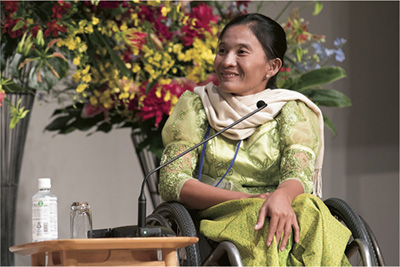 Ms. Sieng Sokchan
Ms. Sieng SokchanMs. Sokchan began by introducing her own life story. Despite discrimination and domestic violence by her family and husband after becoming paralyzed from the waist down by a stray bullet in a conflict, the establishment of the Battambang Women Wheelchair Basketball Team in 2012 through support from the International Committee of the Red Cross, empowered her to take place in society, and thereby she regained her confidence.
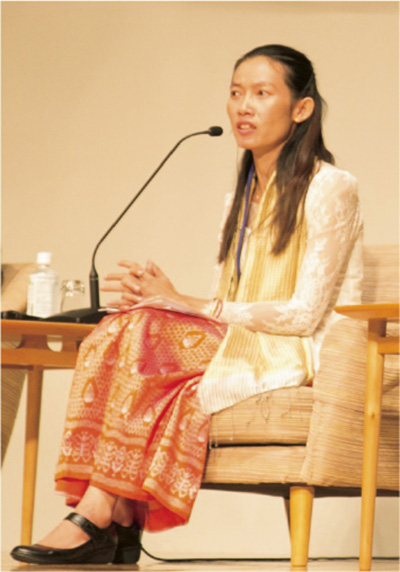 Ms. Sun Sreytouch
Ms. Sun SreytouchMs. Sreytouch, who supports for disabled people, represented the voices from the field. She learned through her experience working with disabled women that disabilities are not a barrier in itself. If the community and society provide equal opportunities, they can do anything that a non-disabled person can do.
Finally, Ms. Schuurman concluded the session by stating that if women reach out to one another, they have the potential to change the world.
Panel Discussion 2: Sports and Women
~ The environment surrounding female athletes, and issues specific to women ~
[Moderator: Ms. Maoko Kotani. Panelists: Ms. Kaori Icho (Gold medalist for wrestling in the Rio Olympics), Ms. Sae Tsuji (Bronze medalist for track and field in the Rio Paralympics), Ms. Mayumi Narita (Gold medalist for swimming in the Athens Paralympics), Ms. Hiromi Miyake (Bronze medalist for weight lifting in the Rio Olympics).]
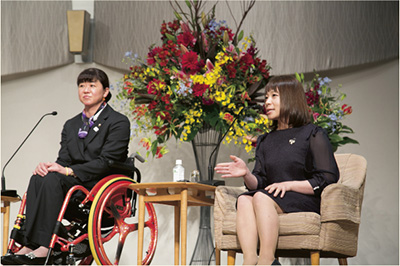 Ms. Mayumi Narita and Ms. Hiromi Miyake
Ms. Mayumi Narita and Ms. Hiromi MiyakeMs. Icho explained that although men are physically stronger, women are more flexible and have greater mental resilience; for this reason, women excel competing as athletes for a long time.
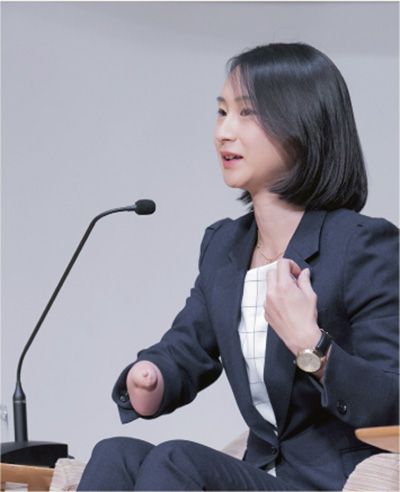 Ms. Rie Tsuji
Ms. Rie TsujiMs. Miyake, who also serves as a coach, explained that women's muscles are converted to fat more easily, so their bodies become more rounded if they take even a short break off from their training. Raising the example of needing to change the training programs for men and women, she pointed out that it is necessary to understand women's physical characteristics before training them.
Ms. Tsuji highlighted the lack of female trainers and staff, and stated her view that there are many advantages to having trainers and staff of the same gender. For example, female staff can assist female athletes with their uniforms and to help to undertake mental preparation before a game.
Ms. Icho touched on the topic of specific changes in women's bodies. This topic can be sensitive for female athletes, due to symptoms such as weight increase or emotional instability around the time of menstruation. She also pointed out that athletes with severe symptoms sometimes take medication, and it is difficult to gain understanding of when the coaches and staff members are male. Hence, she highlighted the importance of consulting with physicians and finding medicines that are suitable for oneself.
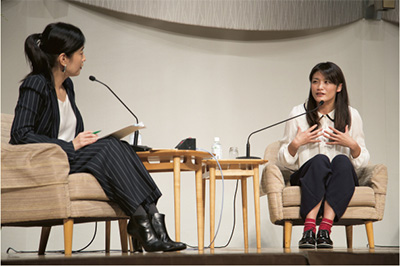 Ms. Kaori Icho
Ms. Kaori IchoMs. Miyake spoke about marriage and childbirth as problems that are specific to female athletes. She explained the difficulty of balancing a sporting career with marriage and childbirth as it takes about three years to focus on training in order to compete in the Olympic and Paralympic Games. On the other hand, she talked about her hopes for a time in the future when female athletes are able to experience marriage and childbirth while continuing with their sporting careers.
Ms. Narita explained that as female athletes are constantly concerned about their competitions and their physical condition, they also wish to enjoy fashion and gourmet dining as women outside of their competitive life. She explained that this awareness of femininity was one of the things she had learned through sports.
~ Message to women in Japan and around the world ~
Ms. Miyake: We are entering an era where women are becoming more powerful. For example, many women have been successful in the Olympic Games in recent years. Despite differences in physical strength, I aim to take advantage of my feminine characteristics and accomplish things that only I can do.
Ms. Narita: I hope to make the 2020 Paralympic Games a success with many people from around the world feeling glad that they come to Tokyo. Women hold significant power, so my aim is to provide support for women to utilize this power across the world.
Ms. Tsuji: While our world is still far from being comfortable for women to live in, and we sometimes experience difficulties in the workplace, I am eager to communicate the strengths of women to society by my involvement in sports. I hope that women can work together to realize women's active engagement in their respective sectors and in the areas they excel in.
Ms. Icho: As a woman who has, till now, experienced many valuable things through sports, and as a female athlete, I hope to highlight issues (matters concerning various issues) to society and put my best efforts into resolving these issues.


